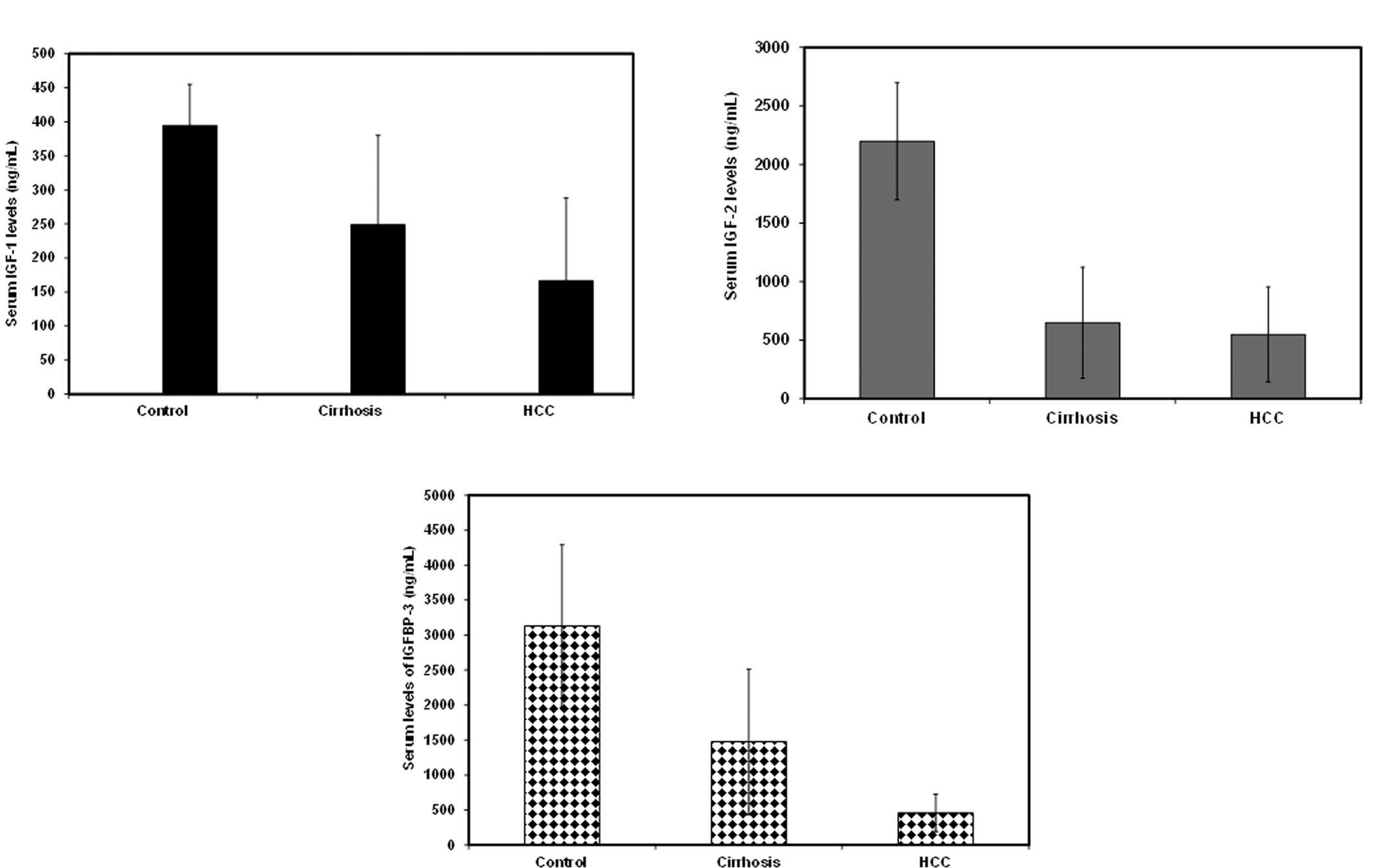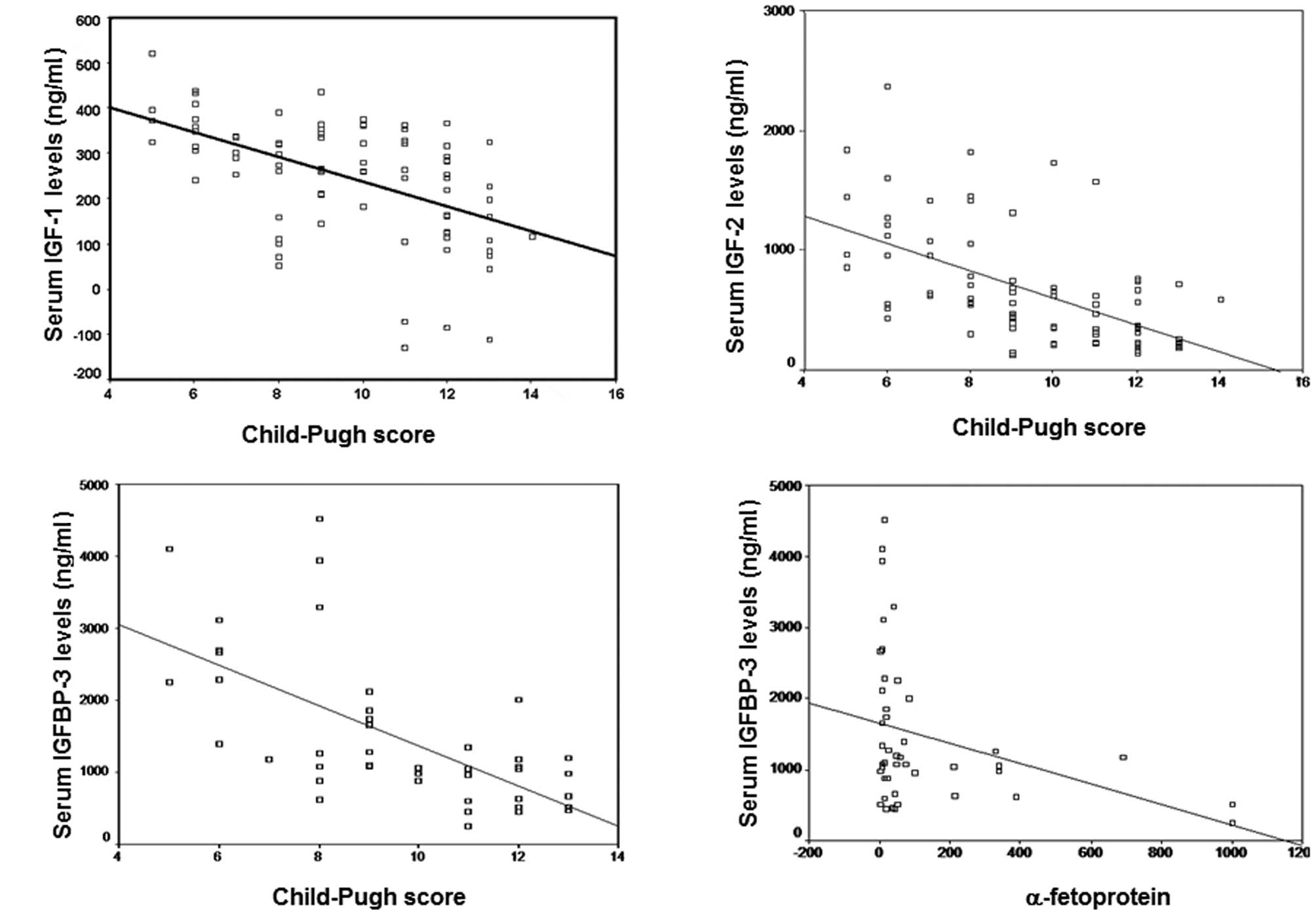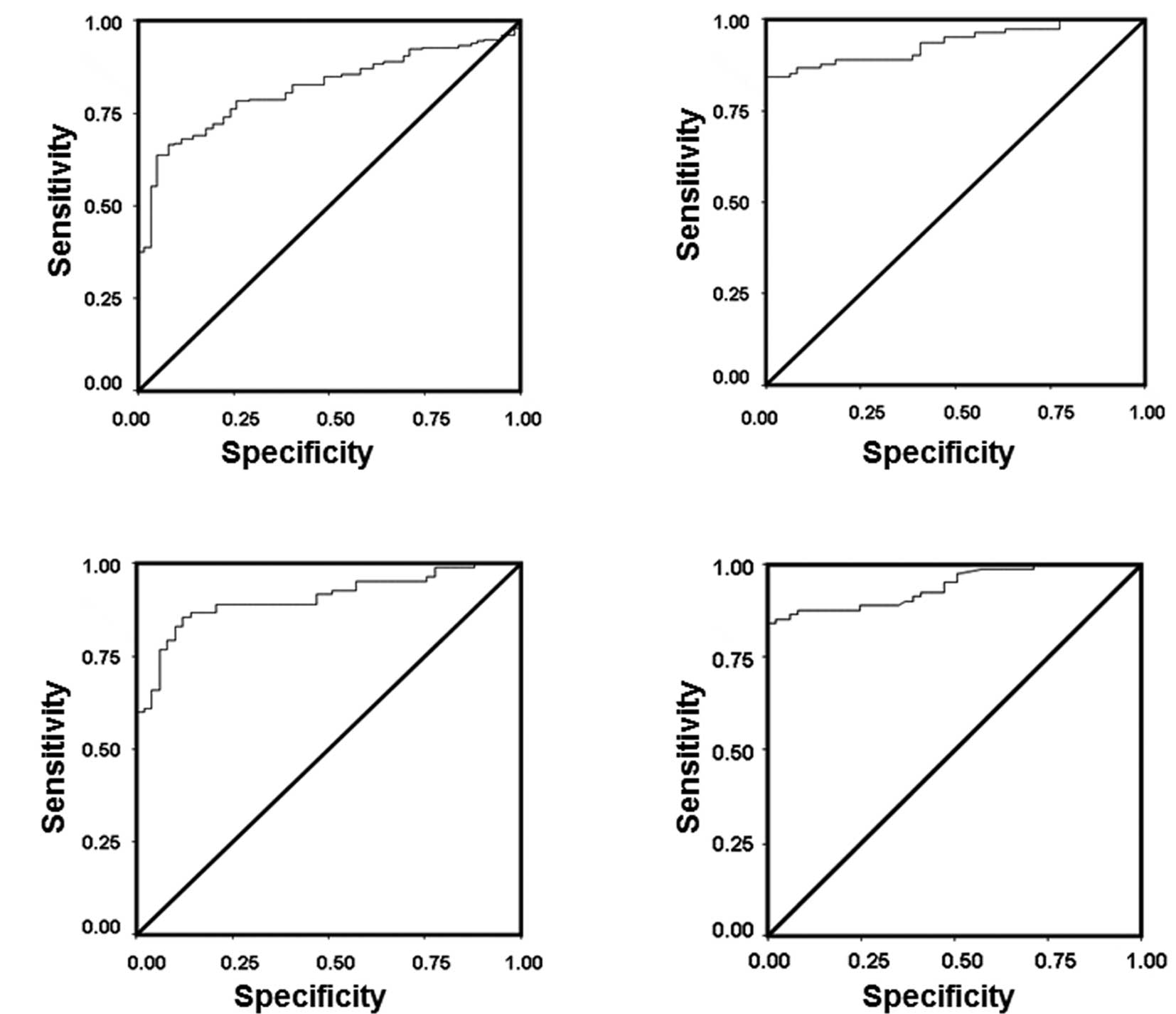|
1
|
Hsieh PM, Hung KC and Chen YS: Tumor lysis
syndrome after transarterial chemoembolization of hepatocellular
carcinoma: case reports and literature review. World J
Gastroenterol. 15:4726–4728. 2009. View Article : Google Scholar : PubMed/NCBI
|
|
2
|
Anwar WA, Khaled HM, Amra HA, El-Nezami H
and Loffredo CA: Changing pattern of hepatocellular carcinoma (HCC)
and its risk factors in Egypt: possibilities for prevention. Mutat
Res. 659:176–184. 2008. View Article : Google Scholar : PubMed/NCBI
|
|
3
|
Sievert W, Altraif I, Razavi HA, et al: A
systematic review of hepatitis C virus epidemiology in Asia,
Australia and Egypt. Liver Int. 31(Suppl 2): 61–80. 2011.
View Article : Google Scholar : PubMed/NCBI
|
|
4
|
Thorgeirsson SS and Grisham JW: Molecular
pathogenesis of human hepatocellular carcinoma. Nat Genet.
31:339–346. 2002. View Article : Google Scholar : PubMed/NCBI
|
|
5
|
Furstenberger G and Senn HJ: Insulin-like
growth factors and cancer. Lancet Oncol. 3:298–302. 2002.
View Article : Google Scholar
|
|
6
|
Nehrbass D, Klimek F and Bannasch P:
Overexpression of insulin receptor substrate-1 emerges early in
hepatocarcinogenesis and elicits preneoplastic hepatic
glycogenosis. Am J Pathol. 152:341–345. 1998.PubMed/NCBI
|
|
7
|
Aleem E, Nehrbass D, Klimek F, Mayer D and
Bannasch P: Upregulation of the insulin receptor and type I
insulin-like growth factor receptor are early events in
hepatocarcinogenesis. Toxicol Pathol. 39:524–543. 2011. View Article : Google Scholar : PubMed/NCBI
|
|
8
|
Rosen CJ and Pollak M: Circulating IGF-I:
new perspectives for a new century. Trends Endocrinol Metab.
10:136–141. 1999. View Article : Google Scholar : PubMed/NCBI
|
|
9
|
Rosenfeld RG, Kofoed E, Little B, et al:
Growth hormone insensitivity resulting from post-GH receptor
defects. Growth Horm IGF Res. 14(Suppl A): S35–S38. 2004.
View Article : Google Scholar : PubMed/NCBI
|
|
10
|
Jones JI and Clemmons DR: Insulin-like
growth factors and their binding proteins: biological actions.
Endocr Rev. 16:3–34. 1995.PubMed/NCBI
|
|
11
|
Mazziotti G, Sorvillo F, Morisco F, et al:
Serum insulin-like growth factor I evaluation as a useful tool for
predicting the risk of developing hepatocellular carcinoma in
patients with hepatitis C virus-related cirrhosis: a prospective
study. Cancer. 95:2539–2545. 2002. View Article : Google Scholar
|
|
12
|
Su WW, Lee KT, Yeh YT, et al: Association
of circulating insulin-like growth factor 1 with hepatocellular
carcinoma: one cross-sectional correlation study. J Clin Lab Anal.
24:195–200. 2010. View Article : Google Scholar : PubMed/NCBI
|
|
13
|
Tovar V, Alsinet C, Villanueva A, et al:
IGF activation in a molecular subclass of hepatocellular carcinoma
and pre-clinical efficacy of IGF-1R blockage. J Hepatol.
52:550–559. 2010. View Article : Google Scholar : PubMed/NCBI
|
|
14
|
Sidlova K, Pechova M, Kotaska K and Prusa
R: Insulin-like growth factor binding protein-3 in patients with
liver cirrhosis. Physiol Res. 51:587–590. 2002.PubMed/NCBI
|
|
15
|
Wu YL, Ye J, Zhang S, Zhong J and Xi RP:
Clinical significance of serum IGF-I, IGF-II and IGFBP-3 in liver
cirrhosis. World J Gastroenterol. 10:2740–2743. 2004.PubMed/NCBI
|
|
16
|
Bruix J and Llovet JM: Hepatocellular
carcinoma: is surveillance cost effective? Gut. 48:149–150. 2001.
View Article : Google Scholar : PubMed/NCBI
|
|
17
|
Spangenberg HC, Thimme R and Blum HE:
Serum markers of hepatocellular carcinoma. Semin Liver Dis.
26:385–390. 2006. View Article : Google Scholar : PubMed/NCBI
|
|
18
|
Srinivas PR, Kramer BS and Srivastava S:
Trends in biomarker research for cancer detection. Lancet Oncol.
2:698–704. 2001. View Article : Google Scholar : PubMed/NCBI
|
|
19
|
Kato N, Yokosuka O, Omata M, Hosoda K and
Ohto M: Detection of hepatitis C virus ribonucleic acid in the
serum by amplification with polymerase chain reaction. J Clin
Invest. 86:1764–1767. 1990. View Article : Google Scholar : PubMed/NCBI
|
|
20
|
Aishima S, Basaki Y, Oda Y, et al: High
expression of insulin-like growth factor binding protein-3 is
correlated with lower portal invasion and better prognosis in human
hepatocellular carcinoma. Cancer Sci. 97:1182–1190. 2006.
View Article : Google Scholar
|
|
21
|
McShane LM, Altman DG and Sauerbrei W:
Identification of clinically useful cancer prognostic factors: what
are we missing? J Natl Cancer Inst. 97:1023–1025. 2005. View Article : Google Scholar : PubMed/NCBI
|
|
22
|
Shaarawy M, Fikry MA, Massoud BA and Lotfy
S: Insulin-like growth factor binding protein-3: a novel biomarker
for the assessment of the synthetic capacity of hepatocytes in
liver cirrhosis. J Clin Endocrinol Metab. 83:3316–3319. 1998.
View Article : Google Scholar : PubMed/NCBI
|
|
23
|
Mattera D, Capuano G, Colao A, et al:
Increased IGF-I: IGFBP-3 ratio in patients with hepatocellular
carcinoma. Clin Endocrinol (Oxf). 59:699–706. 2003. View Article : Google Scholar : PubMed/NCBI
|
|
24
|
Elsammak MY, Amin GM, Khalil GM, Ragab WS
and Abaza MM: Possible contribution of serum activin A and IGF-1 in
the development of hepatocellular carcinoma in Egyptian patients
suffering from combined hepatitis C virus infection and hepatic
schistosomiasis. Clin Biochem. 39:623–629. 2006. View Article : Google Scholar
|
|
25
|
Okan A, Comlekci A, Akpinar H, et al:
Serum concentrations of insulin-like growth factor-I and
insulin-like growth factor binding protein-3 in patients with
chronic hepatitis. Scand J Gastroenterol. 35:1212–1215. 2000.
View Article : Google Scholar : PubMed/NCBI
|
|
26
|
Hanafusa T, Yumoto Y, Nouso K, et al:
Reduced expression of insulin-like growth factor binding protein-3
and its promoter hypermethylation in human hepatocellular
carcinoma. Cancer Lett. 176:149–158. 2002. View Article : Google Scholar : PubMed/NCBI
|
|
27
|
Luo SM, Tan WM, Deng WX, Zhuang SM and Luo
JW: Expression of albumin, IGF-1, IGFBP-3 in tumor tissues and
adjacent non-tumor tissues of hepatocellular carcinoma patients
with cirrhosis. World J Gastroenterol. 11:4272–4276.
2005.PubMed/NCBI
|
|
28
|
Huynh H, Chow PK, Ooi LL and Soo KC: A
possible role for insulin-like growth factor-binding protein-3
autocrine/paracrine loops in controlling hepatocellular carcinoma
cell proliferation. Cell Growth Differ. 13:115–122. 2002.
|
|
29
|
Park IY, Sohn BH, Yu E, et al: Aberrant
epigenetic modifications in hepatocarcinogenesis induced by
hepatitis B virus X protein. Gastroenterology. 132:1476–1494. 2007.
View Article : Google Scholar : PubMed/NCBI
|
|
30
|
Shon JK, Shon BH, Park IY, et al:
Hepatitis B virus-X protein recruits histone deacetylase 1 to
repress insulin-like growth factor binding protein 3 transcription.
Virus Res. 139:14–21. 2009. View Article : Google Scholar : PubMed/NCBI
|
|
31
|
Ricort JM, Lombet A, Lassarre C and Binoux
M: Insulin-like growth factor binding protein-3 increases
intracellular calcium concentrations in MCF-7 breast carcinoma
cells. FEBS Lett. 527:293–297. 2002. View Article : Google Scholar
|
|
32
|
Ricort JM and Binoux M: Insulin-like
growth factor-binding protein-3 activates a phosphotyrosine
phosphatase. Effects on the insulin-like growth factor signaling
pathway. J Biol Chem. 277:19448–19454. 2002. View Article : Google Scholar : PubMed/NCBI
|
|
33
|
Ricort JM and Binoux M: Insulin-like
growth factor binding protein-3 stimulates phosphatidylinositol
3-kinase in MCF-7 breast carcinoma cells. Biochem Biophys Res
Commun. 314:1044–1049. 2004. View Article : Google Scholar : PubMed/NCBI
|
|
34
|
Weng CJ, Hsieh YH, Tsai CM, et al:
Relationship of insulin-like growth factors system gene
polymorphisms with the susceptibility and pathological development
of hepatocellular carcinoma. Ann Surg Oncol. 17:1808–1815. 2010.
View Article : Google Scholar : PubMed/NCBI
|
|
35
|
El-Houseini ME, Mohammed MS, Elshemey WM,
Hussein TD, Desouky OS and Elsayed AA: Enhanced detection of
hepatocellular carcinoma. Cancer Control. 12:248–253.
2005.PubMed/NCBI
|
|
36
|
Rehem RN and El-Shikh WM: Serum IGF-1,
IGF-2 and IGFBP-3 as parameters in the assessment of liver
dysfunction in patients with hepatic cirrhosis and in the diagnosis
of hepatocellular carcinoma. Hepato-gastroenterology. 58:949–954.
2011.PubMed/NCBI
|
|
37
|
Scharf JG, Ramadori G and Dombrowski F:
Analysis of the IGF axis in preneoplastic hepatic foci and
hepatocellular neoplasms developing after low-number pancreatic
islet transplantation into the livers of streptozotocin diabetic
rats. Lab Invest. 80:1399–1411. 2000. View Article : Google Scholar
|
|
38
|
Price JA, Kovach SJ, Johnson T, et al:
Insulin-like growth factor I is a comitogen for hepatocyte growth
factor in a rat model of hepatocellular carcinoma. Hepatology.
36:1089–1097. 2002. View Article : Google Scholar : PubMed/NCBI
|
|
39
|
Qian J, Yao D, Dong Z, et al:
Characteristics of hepatic IGF-ii expression and monitored levels
of circulating IGF-ii mRNA in metastasis of hepatocellular
carcinoma. Am J Clin Pathol. 134:799–806. 2010. View Article : Google Scholar : PubMed/NCBI
|
|
40
|
El Tayebi HM, Salah W, El Sayed IH, et al:
Expression of insulin-like growth factor-II, matrix
metalloproteinases, and their tissue inhibitors as predictive
markers in the peripheral blood of HCC patients. Biomarkers.
16:346–354. 2011.PubMed/NCBI
|
|
41
|
Fan J, Upadhye S and Worster A:
Understanding receiver operating characteristic (ROC) curves. CJEM.
8:19–20. 2006.PubMed/NCBI
|
|
42
|
Scott CD, Martin JL and Baxter RC:
Production of insulin-like growth factor I and its binding protein
by adult rat hepatocytes in primary culture. Endocrinology.
116:1094–1101. 1985. View Article : Google Scholar : PubMed/NCBI
|
|
43
|
Chin E, Zhou J, Dai J, Baxter RC and Bondy
CA: Cellular localization and regulation of gene expression for
components of the insulin-like growth factor ternary binding
protein complex. Endocrinology. 134:2498–2504. 1994.PubMed/NCBI
|
|
44
|
Villafuerte BC, Koop BL, Pao CI, Gu L,
Birdsong GG and Phillips LS: Coculture of primary rat hepatocytes
and nonparenchymal cells permits expression of insulin-like growth
factor binding protein-3 in vitro. Endocrinology. 134:2044–2050.
1994.PubMed/NCBI
|
|
45
|
Scharf J, Ramadori G, Braulke T and
Hartmann H: Synthesis of insulinlike growth factor binding proteins
and of the acid-labile subunit in primary cultures of rat
hepatocytes, of Kupffer cells, and in cocultures: regulation by
insulin, insulinlike growth factor, and growth hormone. Hepatology.
23:818–827. 1996. View Article : Google Scholar
|
|
46
|
Scharf JG, Schmidt-Sandte W, Pahernik SA,
Ramadori G, Braulke T and Hartmann H: Characterization of the
insulin-like growth factor axis in a human hepatoma cell line
(PLC). Carcinogenesis. 19:2121–2128. 1998. View Article : Google Scholar : PubMed/NCBI
|
|
47
|
Stuver SO, Kuper H, Tzonou A, et al:
Insulin-like growth factor 1 in hepatocellular carcinoma and
metastatic liver cancer in men. Int J Cancer. 87:118–121. 2000.
View Article : Google Scholar : PubMed/NCBI
|
|
48
|
Major JM, Stolzenberg-Solomon RZ, Pollak
MN, Snyder K, Virtamo J and Albanes D: Insulin-like growth factors
and liver cancer risk in male smokers. Br J Cancer. 103:1089–1092.
2010. View Article : Google Scholar : PubMed/NCBI
|
|
49
|
Bonefeld K and Moller S: Insulin-like
growth factor-I and the liver. Liver Int. 31:911–919. 2011.
View Article : Google Scholar : PubMed/NCBI
|

















